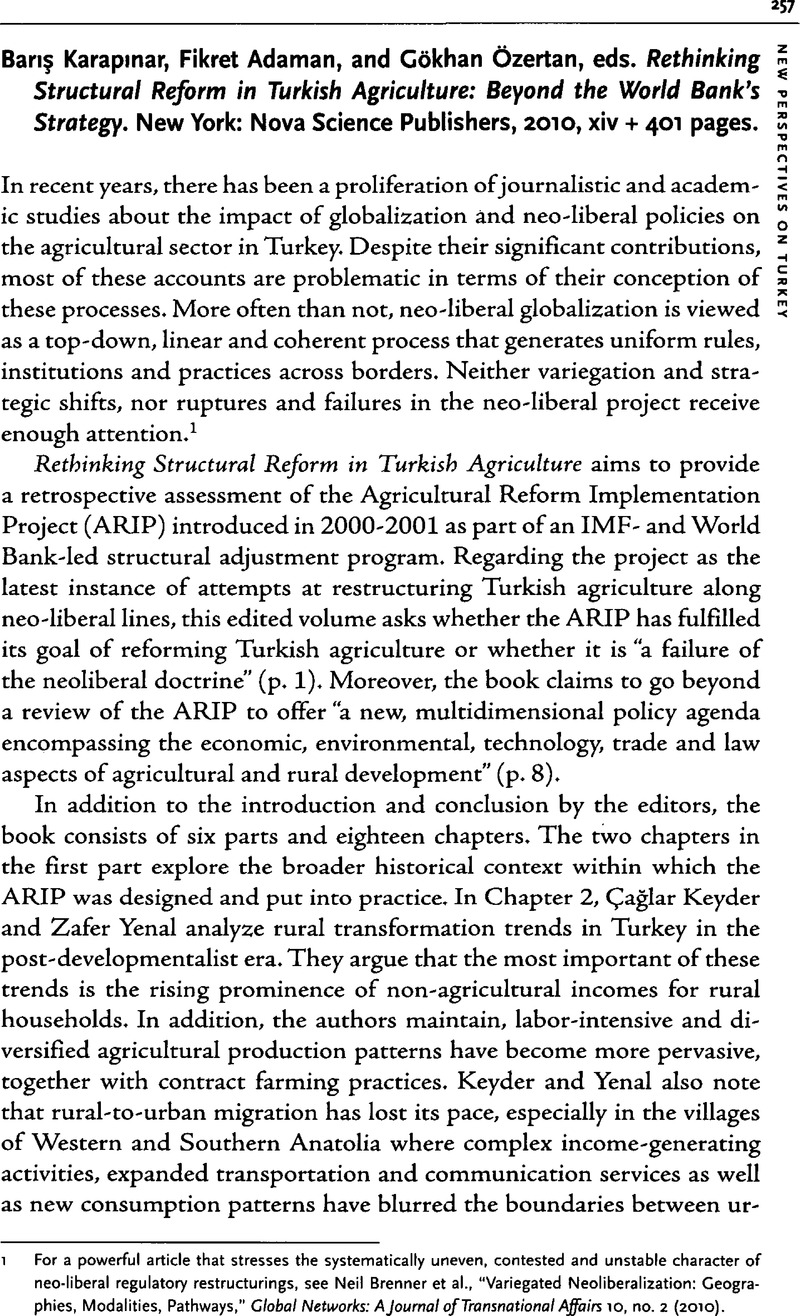No CrossRef data available.
Article contents
Barış Karapınar, Fikret Adaman and Gökhan Özertan, eds. Rethinking Structural Reform in Turkish Agriculture: Beyond the World Bank's Strategy. New York: Nova Science Publishers, 2010, xiv + 401 pages.
Review products
Published online by Cambridge University Press: 21 July 2015
Abstract

- Type
- Book Reviews
- Information
- New Perspectives on Turkey , Volume 45: Special Issue on Turkishness and Its Discontents , Fall 2011 , pp. 257 - 262
- Copyright
- Copyright © New Perspectives on Turkey 2011
References
1 For a powerful article that stresses the systematically uneven, contested and unstable character of neo-liberal regulatory restructurings, see Brenner, Neilet al., “Variegated Neoliberalization: Geographies, Modalities, Pathways,” Global Networks: A Journal of Transnational Affairs 10, no. 2 (2010).CrossRefGoogle Scholar
2 For a fine account, see Güven, AN Burak, “Reforming Sticky Institutions: Persistence and Change in Turkish Agriculture,” Studies in Comparative International Development 44, no. 2 (2009).CrossRefGoogle Scholar
3 For instance, see Stiglitz, Joseph, “The Post-Washington Consensus,” in Initiative for Policy Dialogue Working Paper (Columbia University, 2004);Google ScholarKrogstad, Erlend, “The Post-Washington Consensus: Brand New Agenda or Old Wine in a New Bottle?,” Challenge 50, no. 2 (2007);CrossRefGoogle ScholarÖniş, Ziya and Şenses, Fikret, “Rethinking the Emerging Post-Washington Consensus,” Development and Change 36, no. 2 (2005)CrossRefGoogle Scholar.
4 Güven, Ali Burak, “Post-Washington Consensus in Action: Lessons from Turkey” (paper presented at the Annual Meeting of the Canadian Association of Political Science, University of British Columbia, Vancouver, BC, June 4, 2008).Google Scholar
5 The growing interest by the mainstream development thinking in the importance of institutions for the effective functioning of markets and in new development goals can be observed, for instance, in World Bank, “World Development Report 1997: The State in a Changing World,” (Washington, D.C.: World Bank, 1997); World Bank, “World Development Report 2002: Building Institutions for Markets,” (Washington, D.C.: World Bank, 2001); World Bank, “World Development Report 2003: Sustainable Development in a Dynamic World,” (Washington, D.C.: World Bank, 2002); World Bank, “World Development Report 2008: Agriculture for Development,” (Washington, D.C.: World Bank, 2007).


